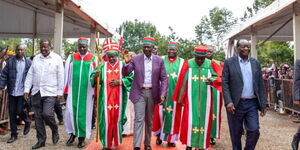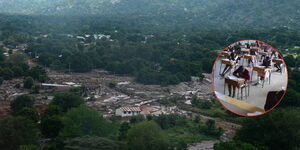Eight Kenyatta University (KU) students have made milestones in their bid to launch Kenya's first satellite into space.
The KU students are in the final steps of their project before launching their satellite to space this August.
Their launch plan received a boost from the Kenya Space Agency which offered them a Ksh1 million grant for the project. This is after the proposal 'Operational Space Weather and Nano-Satellite Development' met the minimum thresholds.
According to the institution, the prototype is named the 'KU CUBE' Nano-Satellite Prototype for Imagery Telemetry and Drones for Agricultural and Disaster Management.
"This cube will go into space by August, carrying a Kenyan-made branding for the rest of the world to know that this country can come up with such a space technology," 22-year-old Jeff Ayako, supervisor of the project told The Standard.
The cube will be launched 200 kilometers above the ground through a prototype that will be tried at 37kms.
The satellite is expected to travel at 28,000Kms per hour which translates to 16 times the speed of a bullet. The innovation will take 98.77 minutes to complete an orbit.
The satellite will only weigh a kilo and will have a parameter of 10cm by 10cm. The cost of lifting it to the space is Ksh1 million.
The satellite is fitted with cameras responsible for taking images that will be studied for geographical and geomatic information systems.
The data received through the satellite will be used to predict looming agricultural disasters such as the locust invasion and informing the farmers of trends to help them properly manage their calendar.
"Data received through the satellite will help in predicting and informing the public about locust migration, giving farmers a heads up about the presence of locusts before they even arrive. we are giving farmers the capacity to engage with space technology," software developer Allan Koech stated.
The idea was developed out of a pumpkin that looked very fragile but solid enough to carry its content.
"Interestingly, our idea came from a pumpkin that looks very fragile but is solid enough to carry its content. If a single item fails, it will mess up the entire project," Tadzi Stower, project's orbital mechanics stated.












